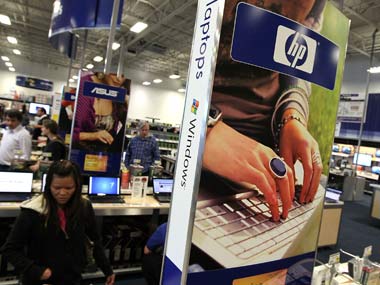It’s been a busy week for Hewlett Packard, and not necessarily in a good way. Its TouchPad has now officially bombed and its Pre 3 has been soundly rejected by UK mobile operators. It is discontinuing its mobile operation system, WebOS and spinning off its PC unit. It has also bought search and analytics company Autonomy for $11 billion, in a move to leave its consumer-facing business behind and become an enterprise software and services company.
Let’s start with HP’s TouchPad, which launched at the end of June. Walt Mossberg from All Things D reviewed the tablet and was far from complimentary:
I’ve been testing the TouchPad for about a week and, in my view, despite its attractive and different user interface, this first version is simply no match for the iPad. It suffers from poor battery life, a paucity of apps and other deficits.
[caption id=“attachment_64972” align=“alignleft” width=“380” caption=“It’s been a busy week for Hewlett Packard, and not necessarily in a good way.Getty Images”]
 [/caption]
[/caption]
With a launch price of $500, it had a similar price point to the iPad, but with an inferior user experience it was always going to be a hard sell. A possibly over-optimistic BestBuy bought 270,000 units but sold only 25,000 and was threatening to send the rest back to HP . Reports are that other US retailers such as Fry’s and Wal-Mart are also struggling to shift the tablet, despite HP dropping the price by $100 and some shops, such as Staples, offering another $100 off.
Impact Shorts
More ShortsThen came news that the UK’s mobile operators had shunned the new HP Pre 3 , the first of HP’s smartphones to run its WebOS operating system. None of the major players are planning on selling it in stores or online. Interested users can still buy the phone from retailers, SIM-free, but the lack of support by the networks was undoubtedly a blow.
By Thursday, HP had announced that it is discontinuing its WebOS operations , including the TouchPad and WebOS phones. Is this smart damage limitation or a sign of desperation?
I haven’t seen either the TouchPad in the flesh, but I’m not surprised that it hasn’t done well. I do have an HP DreamScreen , (not to be confused with the DreamScreen 400 ), and it’s one of the most frustrating pieces of technology I own. The TouchPad is, of course, an entirely different class of device, but if you can’t get a glorified photo frame right, then a fully-fledged tablet is going to be a bit of a challenge.
As for the Pre 3, HP bought Palm in April 2010 , but Palm had struggled for a long time to get anything right. Splitting the company into two along the hardware/software dividing line in 2003 was possibly the stupidest thing that Palm ever did, and neither business ever did as well separately as they had done together. HP was smart to ditch the sclerotic PalmOS in favour of WebOS, and the Pre 3 got decent reviews, but it had a tiny market share and an even smaller mindshare. It would take a huge marketing effort to change that, particularly in competition with the iPhone and Android phones.
Now, HP has announced the acquisition of enterprise search and analytics company Autonomy for $11 billion . HP CEO Leo Apotheker said:
Autonomy represents an opportunity for HP for us to accelerate our vision to decisively and profitably lead a larger win space which is the enterprise information management space.
It seems that HP is significantly remoulding its business, withdrawing from consumer markets and refocusing on higher margin enterprise markets. Given HP is one of the biggest manufacturers of PCs, turning its back on that market is risky . HP’s Personal Systems Group -its PC, tablet and smartphone division -accounts for a third of its overall revenue. While it might seem sensible to cut exposure to what can be a fickle market, it’s still a gamble. Walking away from newly-launched devices won’t instil confidence in consumers, retailers and resellers. And the future is unclear for WebOS, which is likely to discourage developers from putting any time into developing apps for it, leaving TouchPad and Pre 3 owners even further out in the cold.
Is HP making a big mistake? Or is this a shrewd move to remake its business in a rapidly evolving marketplace?
)